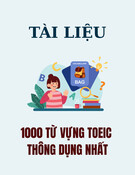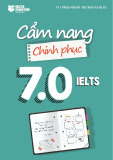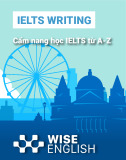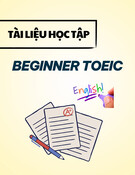VSTEP SPEAKING: COMMON TOPICS
HOMETOWN
I. VOCABULARY
A. TOWN
* Some of the things you will find in big town
Commercial center shopping center car park factories
Suburbs libraries pollution night-life
Traffic museum high buildings noise
B. THE COUNTRY:
* Some of the things you will find in the country
C. Advantages and disadvantages
Cities and towns The countryside
Advantages Exciting and interesting Quiet and peaceful
Convenient Clean
There are a lot of things to do Calm and relaxing
There’s a wide range of shops Has lots of open space
There’s lots of night-life (bars, cinemas, safe
night clubs…)
Disadvantages Noisy Boring
Dirty and polluted Inconvenient
Stressful There’s a few activities to do
Crowded There are only a few shops
dangerous There is no night-life
II. USEFUL STRUCTURES:
- My hometown is …………….. It is located/ situated in the North/ Middle/ South of
Vietnam.
It’s very + adj (comfortable/convenient… ) living there. -
It’s a/an + adj (nice/quiet….) place to live in. -
- Living there is + adj (interesting, noisy….)
I lived there for ……… years. ….. years ago, I moved to……….. -
I have been living there since I was born. -
- My hometown is famous/ well-known for ………………… throughout Vietnam.
It is rich in …………. (oil, mineral deposits…) -
- ………….is the best place in my hometown.
III. SAMPLE ANSWERS:
1. Where are you from? /Where do you come from?
2. Let’s talk about your hometown. What kind of place it is?
My hometown is / I am from/ I come from …………….. It is a beautiful city/province/village in
the North of Vietnam. My hometown is famous for some places of interests such as :
……………………… . Some special/ delicious kinds of food in my hometown are
…………………………………….The weather here is very nice and the people are helpful,
friendly and hospitable.
3. What part of the city do you live in? What is it like living there? / Is it a nice place to live in?
I live in a flat/ rented house in the center of the city. It is a bit noisy and crowded, but it is very
convenience and there are many opportunities for jobs and education.
I live in the suburbs/ outskirts of the city. It is a quiet place to live in. The atmosphere is fresh and
the neighborhoods are helpful and kind.
4. How long have you lived there?
I lived there for ………… years. …………….. years ago, I moved to Hanoi for my education.
I have been living there since I was born in …………….
5. What are the main tourist attractions in your hometown?
6. What do you like about your hometown?
7. If I visited your hometown, what would you advise me to go and see?
There are many famous tourist attractions there such as pagodas, lakes, parks…. For example, you
can visit ……………. when you come to my hometown.
If you visited my hometown, I would suggest that you visit Hoan Kiem Lake. It is very famous for
its ancient beauty and peaceful atmosphere.
8. Has your hometown changed a lot in recent years?
9. What changes have taken place in your hometown?
Yes, it has seen a lot of changes. With the development of the economy, people’s living standards
have been greatly improved.
There are many changes such as the roads are getting wider and better. The transportation has
improved much and there are more and more vehicles travelling on the roads such as cars,
motorbikes, buses…..Besides, buildings are getting higher and higher.
10. What are the problems of your hometown? What are the solutions to these problems?/ What would
you like to change about your hometown?
There are some problems such as overpopulation, traffic jam and pollution of air, water and noise.
In my opinion, the local government should have more effective measures and stricter law. For
example, to reduce air pollution, we should develop the infrastructure, reduce the number of cars
and use public transports.
FAMILY AND FRIENDS
I. VOCABULARY
A. Relatives (= members of your family)
Male Female
Your parents’ parents grandfather grandmother
Your parent’s brother and sister uncle (s) aunt (s)
Your aunt’s/ uncle’s children cousin (s) cousin (s)
Your brother’s/sister’s children nephew(s) niece(s)
The father and mother of the person you marry father-in-law mother-in-law
The brother and sister of the person you marry brother-in-law sister-in-law
The person you marry dies, so you are a widower widow
Your mother or father remarries, so you have a step-father step-mother
B. Family background:
My grandfather was a market gardener. He grew flowers, fruits and vegetables, and sold them in the
market every day. He worked hard all his life, and when he died, his son (now my uncle) and daughter
(my mother) inherited a large house and garden. They carried on the business together until my
mother met my father. They got married, moved to England, and I was born two years later. They
didn’t have any more children, so I am an only child.
C. Family names:
When you are born, your family gives you a first name. (James, Kate, Alex…). Your family name
(also called your surname) is the one that all the family share (Smith, Brown…). Some parents give
their children a middle name, but you usually say this name. Your full name is all the names you have,
e.g. Sarah Jane Smiths.
D. Changing times:
Society changes and so do families. In some places, people may decide to live together but do not get
married. They are not husband and wife, but call each other their partner. There are also many
families in some parts of the world where the child or children live(s) with just their mother or father,
these are sometimes called single-parent families.
E. Friends:
We can use a number of adj before friend:
An old friend a close friend your best friend
There are some kinds of friends:
Colleague roommate classmate
We use ex- for a partner we had in the past but do not nave now:
Ex-husband ex-wife ex-boyfriend ex-girlfriend
II. USEFUL STRUCTURE:
- There are …………… members in my family./ My family has …………… people.
- My father/mother/ sister is a /an + job (teacher, doctor, farmer, student……….)
- My father/mother is ………….. years old.
- My father/mother is the breadwinner of the family.
I often spend time + Ving (chatting, going shopping) with my friends/family. -
I prefer to stay with my family than with my friends because ………… -
III. SAMPLE ANSWERS:
1. Tell me something about your family.
=> There are four people in my family: my father, my mother, my sister and I. My parents used to work in
a state-run company but now they are retired. My sister is a doctor, she’s 25 years old. We are a happy
family.
2. Do you live in a big or small family?
=> I live in a small family. There are four people in my family: my parents, my brother and I. We live in a
small house in……
=> I live in a big family, an extended family with my grandparents, my uncle and aunts living together. We
are very close-knit and quite happy.
3. Do you prefer to have a big or small family? Why?
=> I prefer to have a small family. I think in a small family, we can understand each other better and we
will have more time to take care of all members of the family.
=> I prefer to have a big family because I feel happier if there are many members in the family. We can
talk and share many things. Moreover, it is easier to help each other in a big family.
4. Who often does the housework/shopping/cooking in your family?
=> My mother often does the housework/cooking because she has a lot of free time and she knows how to
do things well. However, when I have free time, I often help her and she also teaches me a lot of things.
5. Who is the breadwinner in your family?
=> My father is the breadwinner in my family. He is a doctor. Every day he works very hard from early
morning until late in the afternoon. He loves his job very much.
6. What do you often do with your family?
=> We are busy with our work during the day so in the evening, we gather to eat dinner together. After
dinner, we watch Tv and talk about our daily activities. My parents often listen to me carefully when I tell
them about my study and my activities at university.
=> I live far from my family so I often come home at weekends. When I come home, I help my parents do
some housework and spend time watching TV with them, talking to them about my life at university.
7. How has family changed in the recent decades in Vietnam?
=> Well, family structure in Vietnam has changed a lot, generally from big to small. Vietnamese used to
have extended family with a few generations living together. However as time go on, people need to move
for their jobs so small family are more common as they’re easily mobile.
8. Do you have many friends? Are they close friends or acquaintances?
=> I have many friends, from my primary school, secondary school, high school and university. However, I
only have some close friends who I can share with them my thoughts and feelings.
9. What do you often do with your friends?
=> When I go out with my friends, we often go to the cinema, go shopping or go to a café, talk about our
daily activities, our study and relationships. Sometimes we go on a picnic at weekends.
10. What is more important to you, family or friends?
=> In my opinion, both family and friends are important but family is more important than friends, because
they are our closest people. They always care for us, and they are always there whenever we need them.
11. Do you prefer to spend time/stay with your family or your friends?
=> I prefer to stay with my friends because when I am with them, I feel very relaxed and happy. We have
many things in common; we can easily talk and share a lot of things.
=> I live far from my family so when I have free time, I prefer to spend time with my family. We often stay
together eating, talking and doing housework. Sometimes we go to visit our relatives.
12. In what ways do family/friends important to you?
=>Family/ Friends are very important to me. Spending time with my family/ friends make me feel happy
and relaxed. My family/ friends often share with me my happiness and sadness. They also help me to
overcome many difficulties in my life.
EDUCATION AND WORK
I. VOCABULARY
A. EDUCATION
* School: Most children in our country follow this route in the state system (=free education)
nursery school – primary school – secondary school - high school - university
When a pupil leaves high school, he or she may choose to go to university or a college or a vocational
school.
* University:
I. Subjects: You can normally do/study these subjects at university:
law philosophy engineering psychology Medicine
architecture politics business agriculture Sociology
II. Departments/ Faculties in University:
English Vietnamese
University of Social Sciences and Humanities Trường Đại học Khoa học xã hội và Nhân văn
Faculty of Archive and Office Management
Khoa Lưu trữ học và quản trị văn phòng
Faculty of History
Khoa Lịch sử
Faculty of International Studies
Khoa Quốc tế học
Faculty of Journalism and Communication
Khoa Báo chí và truyền thông
Faculty of Library and Information Science
Khoa Thông tin- Thư viện
Faculty of Linguistics
Khoa Ngôn ngữ học
Faculty of Literature
Khoa Văn học
Faculty of Management Science
Khoa Khoa học Quản lý
Faculty of Oriental Studies
Khoa Đông Phương học
Faculty of Philosophy
Khoa Triết học
Faculty of Political Science
Khoa Khoa học chính trị
Faculty of Psychology
Khoa Tâm lý học
Faculty of Sociology
Khoa Xã hội học
Faculty of Tourism
Khoa du lịch
Faculty of Vietnamese Studies and Language
Khoa Việt Nam học và Tiếng Việt
Department of Anthropology
Bộ môn Nhân học
Faculty of Mathematics- mechanics – informatics
Khoa Toán-Cơ- Tin học
Khoa Vật lý
Faculty of Physics
Khoa Hóa học
Faculty of Chemistry
Khoa Sinh học
Faculty of Biology
Khoa Địa lý
Faculty of Geography
Khoa Địa chất
Faculty of Geology
Faculty of Hydro-meteorology and Oceanography
Khoa Khí tượng Thủy văn và Hải dương học
Faculty of Environmental science
Khoa Môi trường
Trường Đại học Khoa học Tự nhiên University of Sciences
B. WORK
I. What do you do?
I’m a/an ( + job) e.g. a teacher/ an engineer -
I work in ( + work unit/ general area) e.g a bank/ marketing -
I work for (+ name of company) .e .g VietcomBank -
II. What do you do in your job?
I’m in charge of ( = responsible for ) + N / Ving (marketing work) -
My work/ responsibility involves + Ving (researching customers’needs) -
My work/duty is to + V (research customers’ needs) -
I have to + V (attend a lot of meetings) -
III. Payment
The money we receive every month in our work is called a salary.
E.g. My salary is 3 million VND a month = I earn 3 million VND a month.
The total amount of money you receive in a year is called your income. This could be your salary from one
job, or from different jobs you have. And on this income you have to pay part to the government – called
income tax.
IV. Working hours:
Normally people works in office have a nine-to-five job (regular working hours of full-time jobs). Some
people have part-time jobs, or some have to do shiftwork ( = working at different times, days or nights).
Sometimes when the company is busy, people also have to work overtime (= work extra hours).
V. The career ladder:
To be unemployed ( = out of work) apply for a job have an interview sign a
contract
do a training course have a good salary to do overtime get a
good pay rise
to be/get promoted resign (= quit) to be sacked to retire
II. SAMPLE ANSWERS:
1. Where are you studying?
2. What are you studying? = What is your major/ field of study?
=> I am a first/second year student at USSH. My major is Journalism and Communication. I find my major
is very interesting and useful.
3. Why did you choose this field of study?
=> Since I was small, I have always wanted to be a journalist because I like writing and travelling. I choose
this major because I think it is suitable and useful for my future job. I can learn a lot of interesting
knowledge and skills in this field.
=> Well, my parents and my high school teacher chose it for me because I was very young then and they
helped me make the decision. They said that this major would be very popular in the future. And of course,
they were right.
4. What do you like most about your studies?
=> Well, I think my major is very important in the modern society and it’s very useful, with this major I
can find a good job in the future.
5. What difficulties do you have in your study? What do you do to overcome it?
6. What do you find most difficult about learning English? How to improve your English?
=> I find the most difficult subject is English, because in English, we have to learn a lot of things such as
grammar, vocabulary or pronunciation. We don’t have much time practicing it so it is difficult for us to
communicate in English. However, I am trying to overcome it by learning from different sources such as
from my teacher, my friends and do some online course. I also try to practice listening and writing as much
as possible.
7. What would you like to do after graduating? / in the future?
=> In the future, I want to be a teacher. I love to work with children every day and see them change and
grow. While working with children, I can share with them my knowledge as well as points of view.
=> I want to be a computer programmer. With this job, I can work on many kinds of software which are
useful in our daily life. I like computer and I want to work with something challenging.
8. What qualities/ qualifications do you need to do that job?
=> Well, first of all, I need a bachelor degree in education. If I want to be a successful teacher, experience
in teaching is also very important. Besides, I will need to be a patient and enthusiastic person.
=> To become a computer programmer, I think I will have to have a good degree in computer sciences.
Moreover, I need to be good at both English and computer operation.
HOBBIES AND SPORTS
I. VOCABULARY
Hobbies/ pastimes are activities that we do in our spare time (= free time)
A. Things people play
Cards (computer) games musical instruments (guitar, piano) sports chess
B. Things people collect
Coins stamps antiques CDs books
C. Indoor activities
Listening to music Watching movies dancing collecting reading
Surfin g the internet handicraft making baking cooking sleeping
D. Outdoor activities
Gardening travelling hiking jogging camping
Going to the cinema hanging out with friends going to karaoke bar going to café
Note: When we start a hobby for the first time, we often use the phrase verb take up, and when we stop
doing the hobby, we often use the phrasal verb give up.
I took up golf when I was fifteen, but I gave it up last year.
E. Sports
You normally play a game but do a lot of/ a bit sport.
Play Do go
Swimming Yoga Tennis
Jogging Aerobics Basketball
Running Martial arts Baseball
Skiing Judo volleyball
Mountain climbing Karate Badminton
Sailing Golf
cycling Soccer/football
Table tennis
II. USEFUL STRUCTURES:
In my free time/spare time, I often + V…………………… -
I’m interested in/keen on/fond of N + Ving -
I like………….. best because……………. -
I like/enjoy + N/ Ving……………………… -
I don’t like……………. Because it’s too…………………. I prefer………………….. -
- What I like most about …………….. is that ……………………
I prefer N/Ving to N/Ving because ……………………. -
- My favourite activities/ hobbies/pastimes are ………………………..
III. SAMPLE ANSWERS:
1. Do you have any hobbies?/ What are your favourite hobbies/ pastimes?
=> Yes, I have some hobbies. I am interested in watching TV, collecting stamps and cycling. Among them,
my favourite one is watching TV.
=> Yes, stamp collecting is my favourite hobby because I like travelling very much. Through collecting
stamps, I can see different cultures and scenery of different countries.
2. What do you do in your free time/ after study? / How do you spend your free time?
=> I usually do some reading when I have free time/ after work. When I feel tired, I often watch TV or go
to the cinema.
=> In my free time. I often listen to music, watch TV or read some books. I like reading comic books
because it makes me feel very relaxed.
3. What do you normally do on weekdays? Is it different at weekends?
=> On weekdays, I have to get up early to go to university. I also go to university on Monday and
Wednesday afternoon. In the evening, I do my part-time job as a tutor of English. I feel very busy and
sometimes tired on weekdays. However, at weekends, I often go out with my friends for eating or playing
sports. Sometimes I stay at home, listen to some music, sleep and relax.
=> At weekends, sometimes I invite my friends to my home for a meal. Sometimes we go shopping, go to
the cinema or café, or go for a picnic in the mountain.
=> I live far from my family so at weekends, I prefer to stay with my parents. I often come back to my
hometown, spend time with my family and visit my relatives who live next door.
4. What are some popular hobbies for young people in Vietnam?
=> Well, in Vietnam, people do many different things. For example, some people raise pets, some like
collecting everything from books to coins. Some prefer indoor activities such as listening to music or
reading while others prefer outdoor activities such as shopping or playing sports. However, in my opinion,
young people often do sports or hanging out with their friends.
5. What free time activity would you like to try in the future?
=> Well, if I had time, I would like to take up playing the piano/guitar. I know it’s not easy for me because
it takes a lot of time and practice. However, I like watching others playing the piano and I hope I can do it
one day.
6. What sports do you play?/ What sports are you good at?/ What is your favourite sport?
=> I like playing badminton/ I am good at playing badminton./ My favorite sport is badminton.
In my free time, I often play badminton with my friends and sometimes I play for the local team. It makes
me feel relaxed and healthy. Besides, I also like swimming, running and doing yoga.
=> I like jogging a lot. When jogging, I can go with my friends , see the scenery, breathe the fresh air and
relax after study.
7. What is the most popular sport in your country?
=> I think football is the most popular sport in Vietnam. Many people are interested in it, and many
participate in it, especially young people. Watching or playing football is both very excited.
8. What are the sport facilities like in your country?
=> I think we have a lot of sport facilities nowadays such as sport stadiums, gyms, or swimming pools
basketball courts or football fields. However, these are usually located in sport areas or universities and
they charge a lot if the public want to use them. So I think there should be some facilities in the
communities for people to use freely.
9. What are the advantages of sports?
=> Playing sports has many advantages. First of all, it helps us to be healthy and get fit. We can have
attractive and strong body when playing sports. Moreover, sports connect people together, so that we can
make more friends when playing sports.
10. How important are hobbies/ sports in your life?
=> I think hobbies/ sports are very important to our life. I feel very relaxed and happy when I enjoy my
hobbies/ play sports. I used to feel very weak and tired after studying hard, but now I feel so enegertic and
healthy because I have time to do sports/ to enjoy my hobbies every week.
TRAVEL AND TOURISM
I. VOCABULARY
A. Sightseeing
You may do a bit sightseeing on holiday or you may do a lot of sightseeing. You may visit some of these
things:
temple pagoda cathedral market shopping center
entertainment center statue fountain historical monument disco/ bar
art galleries tourist shops/souvenir shops night clubs national forest
park
B. Things that tourists often do on holiday
Look round the shops/ have a look round the shops Take photos buy souvenirs
Spend a lot of money go out in the evening get lost go sight-seeing
go sailing go surfing go hiking Go shopping
go for a walk/stroll have a picnic have a good time Sunbathe
C. Describing places
The town is full of interesting places.
Hanoi is beautiful but it’s always packed ( = very crowded/ full) with tourists in the summer.
Many beautiful cities have become very touristy ( a negative word = too much tourism)
Hochiminh city is a really lively place ( = full of life and activity) and the night-life is fantastic.
D. Departure on air
This is the usual sequence of activities when you go to the airport.
First, you go to the check-in desk where they weigh your luggage. Usually you are permitted 20
kilos, but if your bags weigh more, you may have to pay excess baggage. The airline representative checks
your ticket and gives you a boarding card for the plane with your seat number on it. Then you go through
passport control where and official checks your passport, and into the departure lounge. Here, you can
also buy things in the duty-free, e.g. perfume, alcohol and cigarettes. About half an hour or forty minutes
before take-off, you are told to go to a gate number, e.g. gate 14, where you wait before you get on the
plane. When you board the plane, you find your seat. If you have hand luggage, you can put it under your
seat or in the overhead locker above your seat. The plane then moves slowly towards the runway, and
when it has permission, it accelerates along the runway and takes off.
E. A visit to a hotel
We stayed in the Carlton Hotel for three nights in July, but I booked our room three months in advance
because it was in the middle of the tourist season. When we arrived, we checked in at reception, and then
the porter carried out suitcases up to our room. I gave him a small tip, as the staff was very friendly and
the rooms were very comfortable. The only problem we had, in fact, was with the shower which didn’t
work very well. (There was something wrong with the shower). We stayed in a twin room (room for
two people with two single beds). Mary and David were husband and wife so they stayed in a double
room. There was one single room for Tom.
NOTE: Be aware of the terms related to tourism and use them correctly:
1. Travel (V/N) – We have travelled all over the country.
- Travel broadens the mind.
2. Trip (n). Mary and John are on a honeymoon trip to Paris.
3. Tour (n). We made a cycling tour of this city.
4. Journey (n). Did you have a good journey?
5. Voyage (n). He tried to make a voyage across the Atlantic.
II. SAMPLE ANSWERS:
1. Do you often travel? When did the last time you travel?
=> I often travel with my family or friends once a year in the summer. The last time I travelled was last
summer holiday when I went to Da Nang with my family. It was a memorable trip.
2. What places in your country do travelers visit most?/ What is the most popular tourist destination in
Vietnam? Why?
=> I think Nha Trang city is one of the most popular destinations in Vietnam. Nha Trang is home to many
famous beautiful spots and landscape. It has many beautiful beaches with find and clean sand, and the blue
ocean water with mild temperature all the year round.
3. Do you prefer travelling alone or in a group? Why?
=> I prefer to travel with a group of friends. I feel very happy when I can talk to them, play games with
them during the trip. Moreover, it is safer and easier to help each other if you travel in group. Sometimes
we stay together in camping sites and explore from there. It’s convenient and economical.
4. Do you like to travel on a package tour?
= > Yes, I like to travel on a package tour. If I go on a package tour, I don’t have to worry about
accommodation or transport. It can save me a lot of trouble.
=> No, I want to travel alone or with a group of friends because we will feel free to go anywhere we like,
eat anything we want to eat. We don’t have to depend on the tour.
5. Do you prefer travelling by air or by train? Why?
=> I prefer to go by train because it is economical and convenient. Moreover, I can do a lot of sight-seeing
on the road sides.
6. If you had a chance to travel, where would you like to go?
=> If I had a chance/ an opportunity, I would like to go to Hawaii, the weather here is very warm and the
beaches are wonderful. I would love to see hula dancing and the palm trees.
7. What are benefits of travelling? Why do so many people like travelling nowadays?
=> I think travelling has a lot of benefits. It helps us feel relax after hard working hours. Besides, travelling
widens our knowledge about different places and cultures. We can taste different kinds of food and explore
new things.
8. What are the positive and negative effects of tourism on local communities?
=> Tourism has many benefits to the local people. They can have more job opportunities or more chances
to earn money by providing local services for tourists such as selling souvenirs, renting transport. Besides,
they can become more open-minded when they communicate with visitors.
=> However, there are also negative effects of tourism, for example environmental pollution. Besides,
tourism can speed up the spread of diseases such as flu or measles. Finally, the life of local people and
animals may be disturbed.
9. Do you think that tourism in Vietnam will develop in the future?
=> Yes, certainly. Vietnam has many beautiful landscapes as well as famous historical places. Moreover,
Vietnamese people are always very hospitable, they’re eager to welcome visitors to experience Vietnamese
culture and customs. However, I also think that the Government should have more policies to improve the
qualities of services in the future.
FASHION AND SHOPPING
I. VOCABULARY
A. Types of clothes
Formal clothes casual clothes (informal clothes) handmade clothes ready-made
clothes
Traditional Vietnamese-style clothes Korean-style clothes
B. Things to wear:
Hat cap conical hat wollen cap scarf beret
Shirt T-shirt blouse dress jeans shorts trousers skirt
Coat jacket suit sweater(jumper) gloves tracksuit top
L
Socks tight boots shoes sandals high-heel shoes trainers
Bracelet necklace earrings belt tie
C. Color and shade
pink white black yellow purple orange green blue
brown grey red navy bule violet dark bright light
D. In the shop
Shop assistant customers service shop window window
shopping
shopping list convenient helpful various colourful
E. Types of shop
department store supermarket newsagent(‘s) butcher(‘s) chemist(‘s)
Greengrocer(‘s) boutique(=clothing store) stationery shoe shops bookshop
II. SAMPLE ANSWERS:
1. How often do you go shopping? What do you often buy?
=> I live with my friends so I go to the market everyday to buy food such as meat, fish, vegetables, eggs…
At weekend, we sometimes go shopping to buy necessary things, for example clothes, shoes and books.
2. Do you prefer to go shopping alone or with other people?
=> It depends on what I want to buy. When I buy food, I prefer to go alone so that I can easily choose what
I want to eat. However, when I want to buy clothes, I prefer to go with my friends or my mother because
they can give me good advice to choose suitable clothes.
3. What kinds of clothes do you like wearing?
=>Normally I like wearing casual clothes such as jeans and T-shirts because they are very convenient and
beautiful. Sometimes I also wear uniform to university as it looks very nice and simple. On special
occasion, I prefer to wear formal clothes such as aodai or long dress (female)/ suit and tie (male).
4. Where do you often buy your clothes?
=> I often buy clothes in a shop near my house. There are various kinds of clothes in the shop, the price is
reasonable. Sometimes I also do shopping online but I have to look carefully at the clothes before I buy
them. I never buy clothes in shopping center because it’s very expensive.
5. What criteria do you base on to choose your clothes? (price/quality or style)
=> When I buy clothes, I always think about comfort first. Therefore I often look at the material first, then
the quality. Sometimes I may choose the style. But as style changes fast, I often choose classical style so
that it will never be out of date.
6. In your opinion, can what people wear show their personality?
=> Yes, I think so. What people are wearing can show their personality to some extent, but it’s not
absolutely. For example, modest people often wear simple clothes such as jeans or T-shirts, or extrovert
people often follow the latest trend while introvert people may like traditional clothes.
7. How has clothing styles changed in Vietnam?
=> I think there have been a lot of changes in clothing styles in Vietnam. About 70 years ago, the most
common clothes for men was a long dress, usually black and white pants. Women wore the same kind with
the colours of grey, black and green. But nowadays, we have different kinds of materials such as silk,
woolen, cotton and various colours. We can have any kind of style and people are encouraged to create
their own unique style.
FOOD AND EATING HABITS
A. Meat, fish and shellfish
pork beef chicken lamb veal duck shrimp crab mussels
cuttlefish carp eal oyster seafood poultry sausages
B. Vegetables
Potato green beans peas carrot cauliflower cabbage mushroom
lettuce tomato cucumber aubergine pumpkin sweetcorn Spinach
C. Fruit:
Apple orange lemon strawberry peach melon pear
Banana grapes pineapple cherry mango grapefruit plum
D. Drinks
Fruit juice tea coffee beer wine milk Coke
E. Ways of cooking food
Boil fry grill bake roast stew steam stir fry
F. Describing food
Tasty= delicious fresh salty >< bland sour>< sweet spicy/hot bitter
fatty
Healthy>< unhealthy oily nutritious gone off
II. SAMPLE ANSWERS:
1. What is your favourite food? How you cook it?
=> My favourite food is seafood. I like all kinds of seafood such as shrimp, crab, cuttlefish, fish and
oysters. Because seafood is very fresh, the easiest and most delicious way to cook them is to steam. You
only have to put some kinds of spices such as salt, ginger and citronella into the seafood and steam it for
some minutes.
2. What food is popular in your country/hometown? Why do people like this type of food?
=> One of the most popular food in my country/hometown is seafood. People like it because there are
many kinds of seafood such as …..… They are fresh, delicious and nutritious. It is also easy to buy and
easy to cook.
3. Is fast food popular in your country? Why?
=> Yes, I think so. Because people are very busy with their study and work, they don’t have much time to
cook so they often eat fast food or takeaways. Especially young people, they like eating fast food because it
is very convenient, they can both sit at the table eating, chatting with each others or even working.
4. Can you tell me something about Vietnamese food?
=> Well, because we have different regions: Northern, Central and Southern, there are various kinds of
special food in each region. However, in a typical Vietnamese meal, we often have steamed rice, a soup
dish, a kind of meat or fish dish and a vegetarian dish (either stir fried or boiled). Besides the typical meals
with rice, Vietnam has many traditional types of food such as pho, crab noodle (bun rieu), springrolls
(nem), Chung cake…
5. Can you cook? What dishes do you often cook?
=> Yes, I can cook. I often cook meals for my family/ friends. I can cook simple dishes such as boiled rice,
fried eggs, fried fish, stewed meat and some kinds of soups.
6. Who usually does the cooking in your home? Why?
=> My mother often does the cooking in my home because she is retired; she has a lot of free time to cook
for the family. She is a wonderful cook.
=> I live with my friends so I and my friends take turn to do the cooking. When I have free time, I will
cook and when I am busy, she does the cooking for us. We can cook simple dishes such as …………..
7. Do you think you eat healthily? What should we eat to stay healthy?
=>I am quite busy with my study so I sometimes eat fast-food or ready-made food, but in generally, I think
I eat healthily. In my opinion, to stay healthy, we have to eat enough meat and fish, eat a lot of vegetables
and drink a lot of water. Besides, we should reduce the amount of fat and eat a little fast food to be healthy.
ENTERTAINMENT
A. CINEMA
1. Types of film
Western science fiction action film comedy thriller
Horror film musical soap opera cartoon love story
2. Describing films
Moving violent powerful gripping funny slow
Blockbuster classic based on a book subtitled dubbed beautifully
filmed
- The film was set in ………… - The main characters are ………………….
- It was based on a novel by………… - It was directed by…………………………
- It was filmed in ………………………… - Kate Winslet played the part of ………………….
- It was about …………………….. - The film was nominated for 11 Oscars.
B. TELEVISION PROGRAM
Music program travel program current affairs program arts program
wildlife program
Sports program educational program talk show quiz show game show documentary
Play drama news regional news weather forecast series
C. MUSIC
1. Kinds of music
Classical music pop rock jazz R&B instrumental music
Folk song soft music dance country music
2. People in music
Composer song writer musician band orchestra soloist singer
Guitarist lead singer drummer pianist dancer
D. READING
1. Kinds of book
Novels(romantic/historical/contemporary novel) short stories detective story ghost stories
Science fiction comic books magazines poem newspapers
2. Talking about books
-It’s a book by …………………. - It’s for children.
- It’s called……………../ Its name is………………… - It has been translated into
…………..
- It’s about …………………. - It has been made into a film
- It’s set in………………… - The main characters are
……………………..
- It’s based on a true story. - The main themes are love and selfishness.
II. SAMPLE ANSWERS:
1. Can you tell me something about the entertainment facilities in your city?
( What are the entertainment facilities like in your city?)
=> There are all kinds of entertainment facilities in my city such as cinemas, theaters, circuses, pubs, bars,
discos, night clubs. Many people also go to karaoke bars to sing and dance the songs that they like.
2. What is the most popular entertainment for young people in your country?
=> Well, I think the most popular entertainment for the young is going online, surfing the internet. There
are many net bars everywhere, and only with a smart-phone, they surf the internet for information, chat
with their friends, log on social networks such as facebook, or send emails to their friends far away.
Sometimes they just play games.
3. What kind of music/film/TV program do you like?
=> My favourite kind of music/ TV program/ film is ………………………… I often listen to it/ watch it
when I have free time. It makes me feel relaxed after stressful working hours.
4. Do you like music? How often do you listen to music?
=> Yes, I do. I think everyone likes music. When I have free time or when I feel stressful, I often listen to
music to relax.
5. What kinds of music/films are popular in your country?
=> There are many popular kinds of music/films in my country such as …………………….. The young
often listen to/ watch …………… while older people prefer ………………………….
6. Can you play any musical instrument? If not, what musical instrument do you wish to play?
=> At the moment, I cannot play any musical instrument but in the future, if I have a chance, I would like
to learn to play the guitar. I feel the sense of romance when I see someone playing the guitar, and I want to
try playing it.
7. Do you prefer watching films at home or at the cinema?
=> I prefer watching films at the cinema because the atmosphere is so good. The sound effect is excellent
and the screen is big, and the images are more vivid.
=> I prefer watching films at home because it is more convenient. You don’t have to go out, just sit on the
sofa, eating anything you like and watching your favourite film. It’s very relaxing.
8. Do you often read? What kinds of book do you like best?
=> Well, to tell the truth, I don’t often read because I am very busy with my study and work so I don’t have
a lot of time to read. However, my favourite kind of books is novel. I often read during summer holiday,
and I like reading classical novels or romantic love stories.
9. What are the benefits of listening to music/ reading?
=> Listening to music / Reading helps people relax and reduce stress after their working hours. Besides, it
also helps broaden our knowledge about different people and cultures in the world.
10. How often do you use the internet? What do you use it for?
=> I often use the internet everday. I use it to look for information for my study and look up the dictionary
when necessary. Besides, the internet also helps me connect with my friends and relatives around the
world, via email or facebook. I also use it for entertainment purposes such as listening to music, watching
films or playing games.
TRANSPORT
I. VOCABULARY
A. Vehicles
Public transport private transport bus van lorry coach
Bicycle(bike) motorbike car cyclo scooter
B. Buses
Sometimes buses are not very punctual. Where I live buses should run every ten minutes, but sometimes I
wait at the bus stop for half an hour with a long queue of people, and the bus comes but it’s full up. On
other occasions the bus is early and I miss it. ( = I cannot catch it).
C. Important words and phrases
Taxis use the road, pedestrians use the pavement.
The speed limit on motorways in VN is 120 kph.
Most petrol stations in Great Britain are self-service.
Get in the car and remember to fasten your seat belt
II. SAMPLE ANSWERS
1. How do you usually travel in your hometown?
=> I usually go by bus as I think it’s very convenient and the bus service is quite good. But sometimes I also ride
a bicycle to university because my home is near the university.
=> I often go by motorbike because it’s convenient and fast. Sometimes I also go by bus with my friends.
2. What are the means of transports used in your city? What is the most popular means of transport?
=> There are many means of transport in my city, including public transport such as buses, taxis and private
transport for example motorbikes, bikes, cars. The most popular means of transport is motorbike. With
motorbikes, it’s convenient to go to various places and in rush hours, motorbikes can go faster and more easily.
3. What are the advantages and disadvantages of using a motorbike?
=> The main advantage of a motorbike is that it’s economical and convenient. You can easily travel to any
places you want and easily find places to put it. However, the main disadvantage a motorbike has is that it can
get stolen very easily if you aren’t careful about it. Another disadvantage is motorbike can cause a lot of
pollution.
4. What are the problems with the transport system of your city?
=> The main problems is that there’s always traffic jams everywhere in rush hours, especially in the city center.
There are a lot of transports on the street and you can walk faster than driving a car or taking a bus.
=> The major problem is the increasing rate of car accidents, especially during holidays. Many people do not
observe carefully or do not follow traffic rules and regulations.
5. How can the transport problems be solved?
=> I think the government should have stricter laws to punish those engaged in drink-driving and high speeding.
The road conditions should be improved and it’s important t raise people’s awareness to observe traffic rules and
regulations.
6. Do you think transport in Vietnam has changed a lot?
=> Well, there have been a lot of changes. First of all, the quality of the automobiles is much better than before.
Second, transport in remoted areas has been improved a lot. And there are more and more people using private
cars.




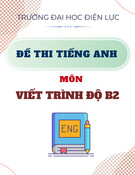


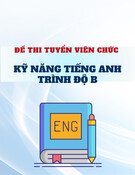

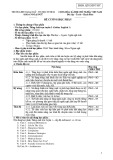
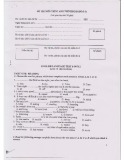
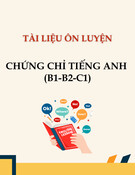
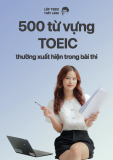
![Tài liệu luyện thi TOEIC cấp tốc trong 10 ngày [chuẩn nhất]](https://cdn.tailieu.vn/images/document/thumbnail/2025/20251029/kimphuong1001/135x160/99661761725822.jpg)
![Tài liệu Phá đảo TOEIC 900+ từ mất gốc trong 30 ngày [Mới nhất]](https://cdn.tailieu.vn/images/document/thumbnail/2025/20251029/kimphuong1001/135x160/2101761720956.jpg)




